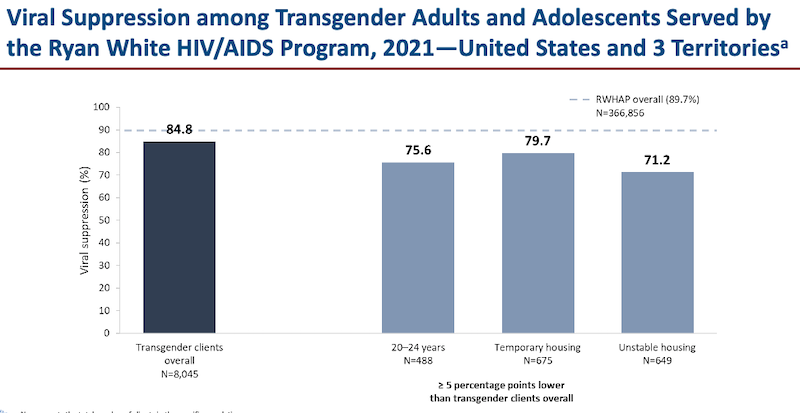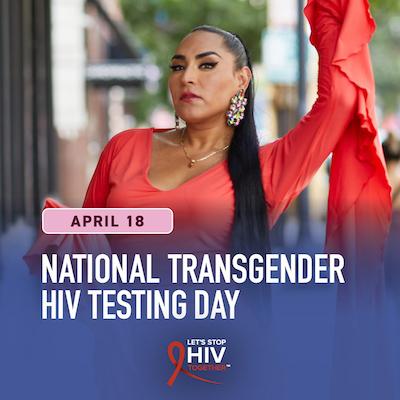
Over half a million individuals get HIV care from HRSA's Ryan White HIV/AIDS Program (RWHAP). In 2021, of the 567,552 clients with a reported gender, 2.4% were transgender. Compared to RWHAP clients identifying as male and female, RWHAP transgender clients are younger, have less stable housing, and have incomes at or below the federal poverty level (Clients Served by the RWHAP, 2021, Overview, PPTX) (HRSA, February 2023).
Viral Suppression and RWHAP Transgender People

HRSA HIV/AIDS Bureau Fact Sheets, March 2023.
The proportion of RWHAP clients achieving viral suppression has risen steadily over the past decade plus--69.5% to 89.7% over the 2010-2022 time frame. RWHAP transgender clients have realized similar improvements (61.5% to 84.8%), although transgender client viral suppression rates lag behind those of RWHAP clients identifying as male and female (Clients Served by the RWHAP: HIV Care Outcomes: Viral Suppression, Slide 5, PPTX) (HRSA, February 2023).
Viral suppression rates are lower among among RWHAP transgender clients ages 20-24 and those living in temporary and unstable housing situations (Transgender Clients Served by the RWHAP, 2021, Slide 15, PPTX) (HRSA, February 2023).

Transgender-Focused HIV Care Interventions
HRSA has funded and number of TA and training projects that focus on engaging and retaining Transgender People with HIV in care. Interventions developed by these projects, with demonstrated effectiveness at improving client HIV outcomes, are included in the Best Practices Compilation. Here are examples from the Compilation, which is continuously updated.
- Bienestar in Los Angeles developed TransActivate to improve timely engagement and retention in HIV care among Latina transgender women.
- Text Me, Girl! is a text messaging intervention that aims to improve linkage to and retention in HIV care, increase adherence to HIV medications, and improve viral suppression and other health outcomes among transgender women ages 18–34 years.
- Healthy Divas and TWEET are two evidence-informed interventions designed for transgender women with HIV. Resources (e.g., implementation guides, videos, brochures, learning modules, brochures) were developed by HRSA's E2i.
SPNS Innovations in Care for Transgender Women of Color
The SPNS initiative, Enhancing Engagement and Retention in Quality HIV Care for Transgender Women of Color Initiative (2012-2017) produced a series of Intervention Manuals with innovative interventions to improve timely entry, engagement and retention in quality HIV care.
Clinical Quality Management
The end+disparities ECHO Collaborative is a HRSA-supported national improvement initiative. Its goal is to measurably increase viral suppression rates for four disproportionately affected RWHAP subpopulations: transgender people; African American women, Latinas, MSM of color, and youth. See the end+disparities ECHO Collaborative Didactic Presentations on transgender people.
Clinical Resources
The National HIV Curriculum includes a training module covering HIV among sexual and gender minorities. Health care professionals may receive continuing education credits for completion of the segment. Topics include epidemiology, HIV risks, barriers to care, and successful care approaches. See also the HHS Guidelines for the Use of Antiretroviral Agents in Adults and Adolescents with HIV and the special patient populations section, Transgender People with HIV.
See more clinical tools in AETC NCRC topic page. Sexual and Gender Minorities.
Ryan White Conference Presentations
Access our Conference Presentations database for sessions from recent Ryan White Conferences, like the workshop at the 2022 National Ryan White Conference on HIV Care & Treatment: Providing Gender-Affirming Care to People with HIV. For a detailed focus on clinical care, see Providing Gender-Affirming Care from the 2022 Ryan White Clinical Care Conference.
